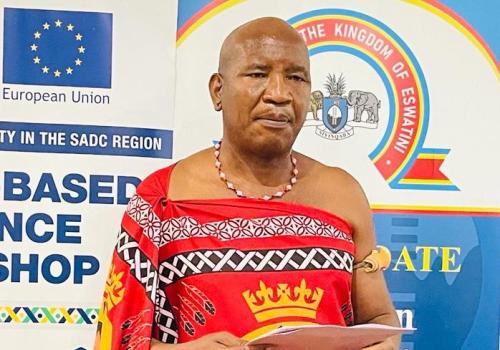The Senate of the Kingdom of Eswatini has executed all possible actions and motions to address identified gaps in reducing or eliminating Gender-Based Violence (GBV) in the country, Acting Senate President, Honourable Ndumiso Mdluli, has said.
In his keynote address at the Senators Gender Sensitisation Workshop in Mbabane, Eswatini, held on 2nd – 3rd August 2022, Acting Senate President Mdluli said there had been media reports on the increase in GBV during in June and since the COVID-19 pandemic.
The sensitisation workshop was aimed at empowering Senators on the GBV situation in Eswatini, while discussing the national legislative policy framework for robust fulfilment of the human rights of all persons experiencing GBV, especially women, the disabled, ageing populace and people living with albinism.
Acting Senate President Mdluli said the current session of the Eswatini Senate will be an eye opener as all relevant stakeholders were equipped with evidence-based approaches on what was happening on the ground in the country. He said Eswatini had propelled the enactment of sound Sexual Gender Based Violence (SGBV) laws through the Southern African Development Community Parliamentary Forum (SADC-PF) model laws and all this had been done with respect to state sovereignty.
He said the country’s parliament frowns strongly upon GBV and had partnered with development partners in the formulation of 2022-2026 Strategic Plan which speaks to legislative framework, institutional image, capacity strengthening where continuous execution and enactment of relevant laws will take place with respect to gender mainstreaming, and gender responsive budgeting.
Eswatini pays respect to the commemoration of International Women’s Day, the Girl Child and respects all cultural ceremonies relating to peace and harmony in the form of Lutsango activities, Umhlanga reed dance, and many more. Its Parliament values family and has Senators who are champions in the execution of GBV outcomes and more as a thematic area.
Acting Senate President Mdluli said the Eswatini Parliament will forever advocate for positive contribution in creating the desired environment for holistic, incremental mainstreaming of gender equality and women’s empowerment in Eswatini. The Eswatini Government will continue to invest timely and appropriately in the welfare of children because they are key to the future of the country and the attainment of the continental vision 2063, he said, adding that it was of great importance that the percentage of women and children who are exposed to violence is reduced both at home and at school. To ensure equity in opportunities for all, Government continues to provide social protection to orphaned and vulnerable children and even the ageing populace, while also providing safety nets even for GBV survivors.
European Union (EU) Ambassador to Eswatini, Her Excellency Ms. Dessislava Choumelova, said over the years, the EU had collaborated with the Government of Eswatini, Civil Society Organisations and other development partners to raise awareness and advocate for the promotion, protection of women’s rights and prevention of sexual offences and domestic violence in the country.
The EU-funded Social Protection Project implemented in partnership with the Deputy Prime Minister’s Office in 2012-2018 contributed in part to the enactment of the Sexual Offences and Domestic Violence Act, 2018. The project further supported community sensitisation in over 12 constituencies in the country to raise awareness on the Act.
H.E Choumelova said another project, ‘‘Me Too, Break the Silence ‘, implemented by FSEJ and COSPE encouraged communities and victims of GBV to speak out and not keep silent whenever they encountered cases of violence against women and girls. The EU had also collaborated with NGOs such as WLSA, SWAGAA, CANGO and Kwakha Indzodza to raise awareness on the plight of women and girls who continue to fall victim to GBV and also to make sure that women’s rights are fully respected and women are seen as leaders, while their socio-economic inclusion and participation in the economic and political life are guaranteed.
Much more needed to be done and everyone, including the Government, civil society, the private sector, schools, religious organisations and families, had a role to play. Eswatini needs an integrated approach as there are a number of social and structural factors that contribute to the vulnerability of women and girls to violence and to teenage pregnancy. The EU was collaborating with UNICEF to help bring pregnant and vulnerable girls back to school, said H.E Choumelova.
She said women in Eswatini must have access to education, land and economic resources so they can become financially independent and be able to stand up to any violation. It was quite clear that women and girls cannot be protected or productive if their basic needs were not met. She said in the last elections in 2018, a civil society organisation supported by the EU played a leading role in the “Vote for a Woman” campaign in order to encourage people to vote for women candidates. It was disappointing that only two women got elected despite these efforts. However, there was still a need for strategies to overcome the mentalities that prevent women from taking on political roles and leadership positions.
H.E Choumelova said sustainable development cannot be achieved without gender equality and a meaningful enhancement in women’s economic and political participation. Gender equality will therefore continue to be mainstreamed across EU funded projects. The EU’s new bilateral programme with Eswatini will have a dedicated gender programme rolling out for implementation late 2023.
The workshop forms part of the EU-funded Support to Peace and Security in the SADC Region (SPSS) Programme which aims at strengthening SADC’s peace and security architecture in the areas of conflict prevention and management and public and human security.

